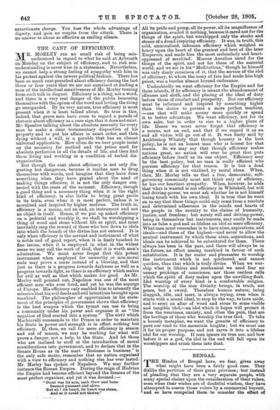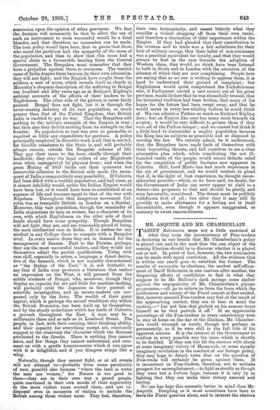what might have been a fairly good case: They dislike
the partition of their great province; but instead of pleading that they are a very separate people, with many special claims upon the consideration of their rulers, even when their wishes are of doubtful wisdom, they have attempted to coerce those rulers by a, commercial boycott, and so have compelled them • to consider the effect of concession upon the opinion of other provinces. We fear the decision will necessarily be that to allow the use of such an instrument to seem successful would be a fatal blunder, and that therefore no concession can be made. The true policy would have been, first to prove that those who resist the partition had the sympathy of the mass of the population, and then to show that this mass had a special claim to a favourable hearing from the Central Government. The Bengalees must remember that they have a prejudice against them to overcome. The warrior races of India despise them because, by their own admission, they will not fight; and the English have caught from the soldiers a sort of scorn, which reveals itself as clearly in Macaulay's eloquent description of the suffering in Bengal One hundred and fifty years ago as in Rudyard. Kipling's satirical accounts of the efforts of their leaders to be Englishmen. The other side of the picture is never fairly painted. Bengal does not fight, but it is through the never-ceasing industry of its vast population, so much greater than that of the United Kingdom, that British India is enabled to pay its way. That the Bengalees add nothing to the military strength of the Empire is true ; bat then also they deduct nothing from its strength on the frontier. No population so vast was ever so peaceable or required so little any expenditure for garrison. A police principally employed in detective work is all that is needed, for forcible resistance to the State is, and will probably always remain, outside the Ben.galee scheme of life. They pay their taxes to the hour, chiefly through their landlords; they obey the legal orders of any Magistrate even when unsupported by physical force ; and when the great Mutiny of 1857 broke out their quiescent but immovable adhesion to the British side, made the recoil-, quest of India a comparatively easy possibility. If Calcutta had been filled with a warlike population, and had risen, as it almost infallibly would, either the Indian Empire would have been lost, or it would have been re-established at an expense of life and treasure equal to that of the war with Napoleon. Throughout that dangerous movement Cal- cutta was as tranquilly British as London on a Sunday. Moreover, this vast population, though the remainder of India stigmatises its men as women, has a character of its own, with which Englishmen on the other side of their beads should have some sympathy. Though Bengalees will not fight, they, are,,and are reasonably proud of being, the most intellectual race in India. It is useless for any student in any College there to compete with a Bengalee rival. In every native State they are in demand for the management of finance. Next to the Parsees, perhaps, they are the most successful traders, and they would not themselves admit the partial qualification. Using with rare skill, especially in satire, a language, a direct deriva- tive of the Sanscrit, which is not unjustly characterised as " the Italian of the East," it is not fantastic to say that if India ever produces a literature that makes an iimpression on the West, it will proceed from the subtle students of Bengal, who, moreover, though they display no capacity for art and little for machine-making, will probably rival the Japanese in their pursuit of scientific investigation, and as money7makers are sur- passed only by the. Jews. The wealth of their great capital, which is perhaps the second wealthiest city within the British Dominion, has been built'up by themselves, and by the steady orderliness which has made of Calcutta a proverb throughout the East. A man may be a millionaire there and as safe as in Lombard Street. The people, in fact, with their cunning, their thinking ability, and their capacity for everything except art, constantly suggest to the observant the character which the Romans attributed to the Greeks. There is nothing they cannot learn, and few things they. cannot understand, and com- ment on with a gentle humorousness which if you agree with it is delightful, and if you disagree stings like a whip.
Naturally, though they cannot fight, or at all events will not attempt to—probably from some peculiarity of race, possibly also because ." where the land is water the men. are women," for Nature is too good to them—they : are in their own. way a. proud people, quite .convinced in their. own minds of their superiority to . the more violent . races around them, and, not in- disposed even . in moments of elation to include the British among those violent races. They feel, therefore, their own homogeneity, and resent bitterly what they consider a violent chopping off from their own ranks, and therefore a diminution of their importance within the Empire. If they bad pleaded that their contribution to the revenue and to trade was a fair substitute for their lack of military energy, that their habit of non-resistance was a practical equivalent for loyalty, and that they would always be first in the race towards the adoption of Western ideas, they would, we think, have been listened to both in Simla and in London with the attention of the absence of which they are now complaining. People here are saying that as no one is wishing to oppress them, it is hard to understand their ground of complaint ; but Englishmen would quite comprehend the Yorkshireman who, if Parliament carved a new county out of his great province, would declare that he was shamefully treated, that his historical tradition had been broken, that many of his hopes for the future had been swept away, and that he would resist in every law-abiding fashion. he could think of. We can admire a Pathan as much as Rudyard Kipling does ; but an Empire like ours has many races beneath its sceptre ; it would be very difficult to govern them if they were all of the Pathan temper; and we cannot but think it a little hard to disconsider a mighty population because the King has no subjects so peaceable and so disposed to worship the law. We entirely admit, be it understood, that the Bengalees have made fools of themselves with their boycotting threats, and fail ourselves to see a. clear alternative plan which, while conciliating the not ill- founded vanity of the people, would secure definite relief for the congestion of public business now apparent in Calcutta. Still, Lord Minto has had much experience in the art of government, and we would venture to plead that if, in the light of that experience, he thought recon- sideration possible—which, as we have said, we doubt, for the Government of India can never appear to yield to a threat—his proposals to that end should be gently, and even favourably, considered. The threat must be publicly withdrawn first of all ; but after that it may still be possible to make allowances for a feeling not in itself discreditable, even though it appears exaggerated, or contrary to sweet reasonableness.



















































 Previous page
Previous page